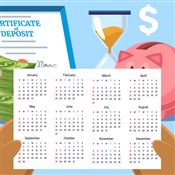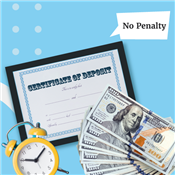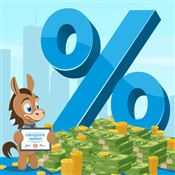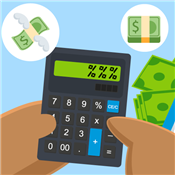Best 13-Month CD Rates for February 2026
Ad Disclosure: This article contains references to products from our partners. We may receive compensation if you apply or shop through links in our content. This compensation may impact how and where products appear on this site. You help support CreditDonkey by using our links.
Plan ahead and grow your savings with a 13-month CD. Discover top 13-month CD rates available today.
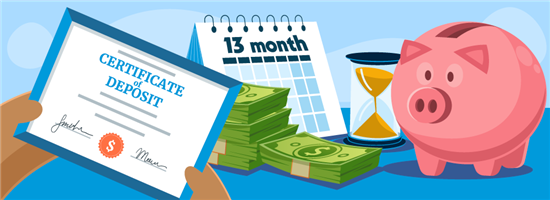 |
- CIT Bank:
3.25% APY
Got some cash that you won't need for the next year+? Why not put it to work?
A 13-month CD lets you secure a competitive interest rate for just over a year.
However, not a lot of banks offer 13-month CDs, so options are limited. Check out who pays the highest rates, and potentially better alternatives to consider.
What is a 13-Month CD?
A 13-month CD is a savings account where you deposit a fixed amount of money for a fixed term of 13 months. In exchange for the commitment, banks and credit unions usually offer a higher APY compared to a regular savings account.
You typically can't access your money until the end of the 13-month term. If you withdraw early, you'll incur penalties that can go up to a few months' worth of interest.
PRO TIP: Currently, one of the highest rates on a 13-month CD is with CIT Bank:
Like most CDs, you cannot withdraw from your 13-month CD without paying penalties. But if you'll need to withdraw early, consider no-penalty CDs to avoid early withdrawal fees.
How Much Interest Does a 13-month CD Earn?
If you have $25,000 in a 13-month CD with a 5% APY, you'd earn $1,357 at the end of the term. To earn the most interest, you want to get a CD with the highest APY available,
Here's a table to illustrate how much you can earn on a 13-month CD with different APY and deposit amounts.
| $10,000 | $25,000 | $50,000 | |
|---|---|---|---|
| 0.00% | $10,000 | $25,000 | $50,000 |
| 0.50% | $10,054 | $25,135 | $50,271 |
| 1.00% | $10,108 | $25,271 | $50,542 |
| 1.50% | $10,163 | $25,407 | $50,813 |
| 2.00% | $10,217 | $25,542 | $51,084 |
| 2.50% | $10,271 | $25,678 | $51,356 |
| 3.00% | $10,325 | $25,814 | $51,627 |
| 3.50% | $10,380 | $25,949 | $51,899 |
| 4.00% | $10,434 | $26,085 | $52,170 |
| 4.50% | $10,488 | $26,221 | $52,442 |
| 5.00% | $10,543 | $26,357 | $52,714 |
| 5.50% | $10,597 | $26,493 | $52,986 |
If you want to see how much your money can grow with other deposit amounts, you can use this simple CD calculator.
Is a 13-Month CD Worth It?
This depends on your financial goals. If you won't need the money for at least a year, a 13-month CD provides a secure place to park your funds and earn some steady passive income.
Before locking in your money, consider the current rate environment. If 13-month CD rates are significantly higher than regular savings accounts or other short-term options, it could be a good way to earn more interest.
Plus, if you worry about interest rates changing, a CD can give you peace of mind since your rate is fixed.
However, if you need easy access to your money, consider other options like a high-yield savings account instead.
And as mentioned, you have limited choices for 13-month CDs. If you're ok with other terms, you'll have a lot more options and maybe even better rates.
Here are some of the top CD rates by term:
| Term | Bank and Yield Rate |
|---|---|
| 3 Month | Western Alliance Bank: |
| 6 Month | Quontic: |
| 1 Year | Western Alliance Bank: |
| 2 Year | Quontic: |
| 3 Year | Quontic: |
| 5 Year | Quontic: |
Yes. Because your deposits in CDs are federally insured, they are one of the safest investments available.
12-Month vs. 13-Month CD
There's little difference between a 12-month CD and a 13-month CD in terms of duration. But, 12-month CDs are more common, making them easier to find.
The key distinction lies in the rates which varies per institution. Some banks and credit unions use odd-term CDs, like 13-month CDs, to offer special rates.
Either way, both can be solid options, especially if you're using CD laddering. Pairing a 12-month or 13-month CD with shorter-term CDs lets you spread out maturity dates and make the most of your savings.
Odd-term CDs are popular for their special rates and enhanced flexibility, making them ideal for those with unique financial goals. They're also an excellent choice for adding variety to a CD laddering strategy.
Can I Lose Money on a 13-Month CD?
In most cases, you won't lose money on a 13-month CD. Your deposits in CDs are federally insured for up to $250,000 for banks or credit unions that are FDIC or NCUA members.
However, you may lose money on a CD from early withdrawal penalties if you withdraw before maturity.
Pros and Cons of a 13-Month CD
Pros
- Lock in high interest rates
You get a fixed interest rate during the entire term. So you get consistent growth for 13 months without being affected by market fluctuations during the term. - Low-risk
A 13-month CD is a safe, low-risk investment. Funds deposited in your CD are federally insured and returns are guaranteed.
Cons
- Early withdrawal penalties
Remember with CDs, your money is tied up the term. You usually can't move your funds without paying early withdrawal penalties. - Miss out on better rates
Interest rates can go up during the term. If you're locked in a 13-month CD with a lower APY, you can miss out on higher earnings. - Limited flexibility
Unlike other investments, you can't add more money to a CD. Nor can you pull out your money early without paying penalties. If you need flexibility, you might want to consider a regular high-yield savings account.
CIT Bank Platinum Savings - 3.75% APY
- 3.75% APY with a balance of $5,000 or more
- 0.25% APY with a balance of less than $5,000
- $100 minimum opening deposit
- No monthly maintenance fee
- Member FDIC
How to Choose the Best 13-Month CD
If you're on the hunt for a 13-month CD, here are three questions to filter your choices:
What is the APY?
You'd want the highest APY to maximize your earnings on a CD. Search for the best options at both banks and credit unions before you commit.
How much is the early withdrawal penalty?
Penalties for 13-month CDs can be a few months' worth of interest. If you might need to close your CD early, look for CDs with lower penalties. Better yet, find no-penalty CDs to avoid paying any fees.
What is the minimum deposit required?
Some CDs may have minimum opening requirements ranging from as low as $1 to over $100,000 (for Jumbo CDs). So make sure to choose a CD that fits your budget.
What will happen when my CD matures?
Before choosing a CD, understand what happens when it matures. Typically, your options upon maturity are the following:
- Automatically renew the CD
- Renew the CD with a different amount, term, or both
- Withdraw all your funds and close the CD
Being aware of this gives you enough time to inform the bank, preventing unwanted auto-renewal and fees.
| APY | Minimum Deposit | |
|---|---|---|
| 3.25% | $1,000 | Learn More |
TIP: If stability is your goal, a Gold IRA could be your answer. Learn how adding gold to your portfolio can offer peace of mind.
How to Open 13-Month CD Account
Opening a 13-month CD can be quick and easy. Here's how to open a 13-month CD:
- Decide which CD to open and where.
Compare rates and banks to find one that matches your financial goals. Also, check if the CD can be opened online, at a branch, or either. - Complete the form and review the terms.
Fill out the application form and gather the required documents. Then, review the terms and conditions which cover details like interest payments, maturity date, and early withdrawal penalties. - Submit and fund your CD.
Once submitted, you can fund your CD through various methods like online transfers, wires, or check deposits.
If you're unsure how to open a CD with a specific bank or credit union, it is best to contact a representative to help you.
It can vary per institution but they usually ask for the following:
- Residential address
- Contact details
- Government-issued ID
- SSN or tax identification number
Alternatives to 13-month CDs
If a 13-month CD is not the best option for you, here are alternatives you can consider:
High-Yield Savings Account
Try getting a high-yield savings account if access to your funds is important. You get the flexibility to add and withdraw funds at any time. These are good for short-term goals, emergencies, or simply savings. But rates may change over time, unlike CDs.
- Raisin:
Up to $1,500 Bonus - Axos Bank:
Earn up to 4.21% APY - Current:
Up to 4.00% bonus - Valley National Bank:
3.90% APY - Mission Valley Bank:
3.86% APY - Western Alliance Bank:
3.80% APY - Live Oak Bank:
Earn 3.80% APY - CIT Bank:
3.75% APY - Quontic:
3.50% APY - UFB Direct:
Unlock Up to 3.46% APY
Longer-term CDs
If you can go beyond 13 months, some longer-term CDs offer competitive rates. And you'll have a lot more choices to choose from.
- Sallie Mae Bank:
14-Month High-Yield CD - 3.50% APY - Quontic:
24 Month CD - 3.35% APY
Shorter-term CDs
On the flip side, you can go for slightly shorter CDs (and some might even have higher rates). These are great to use in a CD ladder strategy.
- Sallie Mae Bank:
10-Month High-Yield CD - 3.50% APY - Western Alliance Bank:
9-Month High-Yield CD - 3.40% APY - Quontic:
12 Month CD - 3.00% APY
No-Penalty CDs
If you're not sure about tying up your money, no-penalty CDs let you withdraw before the term ends with no early withdrawal fees. Think of it like a savings account with locked-in returns.
- Raisin:
No-Penalty CD - Up to $1,500 Bonus - Mission Valley Bank:
3-Month No-Penalty CD - 3.80% APY - CIT Bank No Penalty CD:
3.75% APY - Sallie Mae Bank:
14-Month No Penalty CD - 3.00% APY
Treasury Securities
To lock in rates for a year, check out Treasury bills, notes, and bonds. These are backed in full faith by the government. These make them a safe and reliable investment.
The rule of thumb is to get a CD when interest rates are at their highest. CD rates typically move with the Fed Funds rate. Thus, following their trend can help you decide when to get a 13-month CD.
13-month CD FAQs
Are the interest earnings from this CD taxable?
Yes, according to the IRS, the interest you earn on a CD is taxable interest income. If you earned over $10 on your CD for the year, your bank will send you a Form 1099-INT to report as part of your federal tax returns.
Where to find the best 13-month CD rates?
High 13-month CD rates are usually offered by online banks and credit unions. Online banks can give great rates because of their lower overhead costs. Credit unions can offer the same as they are not-for-profit institutions.
Is a 13-month CD better than a savings account?
If you need easy access to your money, choose a savings account. If not, consider a 13-month CD to lock in potentially higher rates. Both are FDIC-insured, as long as your bank or credit union is an FDIC or NCUA member.
How do I use a 13-month CD in a CD ladder?
CD laddering is a strategy where you break up your money into multiple CDs. This way you have CDs mature at different intervals and get the flexibility to withdraw or reinvest your money.
To visualize how a 13-month CD can be used in this strategy, here's a CD ladder calculator.
Bottom Line
A 13-month CD could be a good choice if you have the money you want to put aside and the current rate is high enough for you. Check out CIT Bank:
However, think about your financial goals and situation first before locking into any investment. Ultimately, you must choose an investment that best suits your plans.
CIT Bank No Penalty CD - 3.75% APY
- Option to withdraw full balance and interest after 7 days of CD funding date
- $1,000 minimum to open an account
- 11 months
- No monthly maintenance fee
- Member FDIC
Write to Rue Atanacio at feedback@creditdonkey.com. Follow us on Twitter and Facebook for our latest posts.
Note: This website is made possible through financial relationships with some of the products and services mentioned on this site. We may receive compensation if you shop through links in our content. You do not have to use our links, but you help support CreditDonkey if you do.
|
|
| ||||||
|
|
|


